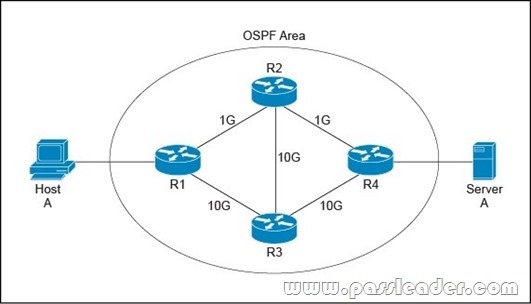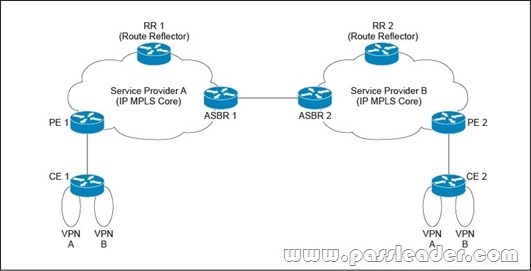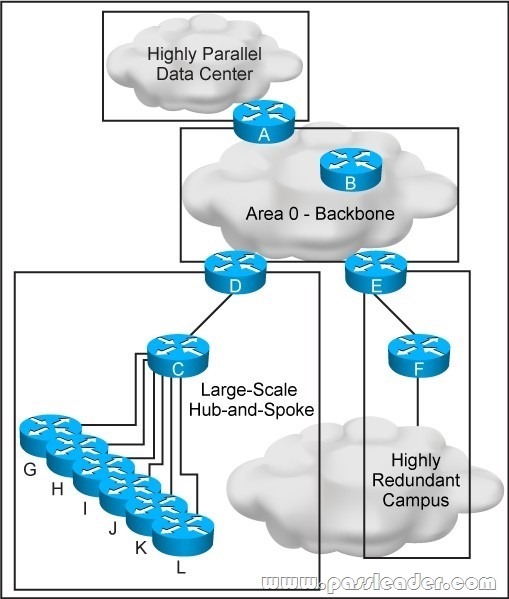The latest 352-001 exam was updated with a lot of new exam questions, old version 352-001 exam dumps are not valid at all, you should get the newest 404q 352-001 practice tests or braindumps to prepare it. Now, PassLeader just published the new 352-001 exam questions with PDF dumps and VCE test software, which have been corrected with many new questions and will help you passing exam easily. Visit www.passleader.com now and get the premium 404q 352-001 exam dumps with new version VCE Player for free download.
keywords: 352-001 exam,404q 352-001 exam dumps,404q 352-001 exam questions,352-001 pdf dumps,352-001 vce dumps,352-001 practice tests,352-001 braindumps,352-001 CCDE Design Expert Written Exam, v2.0

QUESTION 309
Which three options are important functions of IPv6 first-hop security? (Choose three.)
A. implements a broadcast-control mechanism
B. limits IPv6 route advertisement in the network
C. suppresses excessive multicast neighbor discovery
D. prevents IPv6 packet fragmentation
E. prevents rogue DHCP servers from assigning IPv6 addresses
Answer: BCE
QUESTION 310
A customer is running OSPF on a broadcast network type in a DMVPN single-hub, single-cloud topology and dynamically routes from the data center to the branch networks. The customer wants to speed up convergence and to avoid having to elect DRs by changing the network type to point- to-multipoint at the data center and to point-to-point at the branches. Which option will meet the fast convergence requirement and not break any OSPF neighbor adjacencies when this redesign is implemented?
A. The OSPF area containing the branch office routers should be set to stubby.
B. The OSPF neighbors should be set manually at the data center router.
C. The OSPF hello and dead timers should be adjusted at the data center router to match the timers at the remote sites.
D. The OSPF database should be cleared manually for the new network types to take effect.
E. The interface MTU sizes should be increased on all routers.
Answer: C
QUESTION 311
Refer to the exhibit. After this new OSPF design with per-packet load balancing was implemented, Host A reported that large file downloads from Server A became slow and sometimes failed. The operations team discovered that packets are arriving out of order on R1. Which cost-conscious redesign action will fix the issue?

A. Upgrade all links to 10 Gb/s.
B. Adjust MTU sizes to 1500 on all interfaces.
C. Adjust the OSPF auto-cost reference bandwidth on R4.
D. Adjust the OSPF auto-cost reference bandwidth on all routers.
Answer: D
QUESTION 312
On a large enterprise security solution, which two options are IDS or IPS modes of operation? (Choose two.)
A. transparent mode
B. promiscuous mode
C. traffic discovery mode
D. routed mode
E. inline mode
Answer: BE
QUESTION 313
Refer to the exhibit. Service Provider A has offered to help Service Provider B to provide local connectivity for a customer who has a business operation in North America and recently opened an office in Asia. The service to be offered for the customer is a Layer 3 MPLS VPN. Service Provider A and Service Provider B have never shared any business dealings or interconnected their networks. What is the most secure and easiest way for the two service providers to interconnect?

A. carrier supporting carrier
B. eBGP VPNv4 multihop between route reflectors
C. back-to-back VRF
D. VPNv4 peering between ASBRs
Answer: C
QUESTION 314
A large retail bank is designing a unified communications solution to be deployed to its 200 branches. Its current network traffic consists of a web-based portal, Internet browsing, and general file server access. Each branch has between 15 and 20 users. The current WAN is based on Layer 3 MPLS and the customer manages its own CE routers. The WAN circuit interface to the service provider is Gigabit Ethernet, although the MPLS service that is contracted from the service provider is 10 Mb/s. The design is to use a DSCP-based four-class QoS policy to manage traffic demands. From the options below, which two QoS design options that should be implemented on the customer side will meet the requirement? (Choose two.)
A. Shape traffic to 10 Mb/s on the CE router.
B. Police traffic to drop outbound traffic that exceeds 10 Mb/s.
C. Classify DSCP value EF for call signaling and voice packets, and place traffic in a strict priority queue.
D. Priority queue traffic to demand up to 80% of total bandwidth.
E. Enable DSCP-based WRED on all AF classes.
Answer: AE
QUESTION 315
What is the definition of the FCAPS framework?
A. an ISO framework that establishes a model for network management and contains guidelines for managing objects, the management database, and the application entity
B. a five-volume framework for service management that covers design, transition, and delivery of service, and from which the ISO 20000 was developed
C. a series of tools for process improvement that uses statistical methods to reduce defects in processes and manufacturing
D. a framework for enterprise architecture that provides a comprehensive approach for designing, planning, implementing, and governing an enterprise information architecture
E. a framework for enterprise IP Address Management (IPAM) based on the IANA trusted IP lease allocation scheme
Answer: A
QUESTION 316
What are three tools for ongoing monitoring and maintenance of a voice and video environment? (Choose three.)
A. active monitoring via synthetic probes to measure loss, latency, and jitter
B. passive monitoring via synthetic probes to measure loss, latency, and jitter
C. flow-based analysis to measure bandwidth mix of applications and their flows
D. flow-based analysis with PTP time-stamping to measure loss, latency, and jitter
E. call management analysis to identify CAC failures and call quality issues
Answer: ACE
QUESTION 317
In an MPLS-based network, there is a link that constantly flaps. This flapping makes the network constantly reconverge and causes it to become unstable. Which two technologies can be deployed to resolve the design failure? (Choose two.)
A. IP Event Dampening
B. BFD
C. Carrier Delay
D. IP Routing Protocol Route Purge
Answer: AC
QUESTION 318
Refer to the exhibit. This OSPF network has just been deployed with four areas, but the hub-and-spoke area frequently flaps. You must fix this design failure. Which two reasons describe why the implementation of link-state summarization will minimize the effect of the instability in this network? (Choose two.)

A. It lowers CPU utilization on ABR routers.
B. It allows for a more scalable network.
C. It separates the data center area from the hub-and-spoke area.
D. It runs a partial SPF on the campus area when any link of the hub-and-spoke flaps.
E. It minimizes the number of prefixes that are advertised to other areas.
Answer: CD

http://www.passleader.com/352-001.html